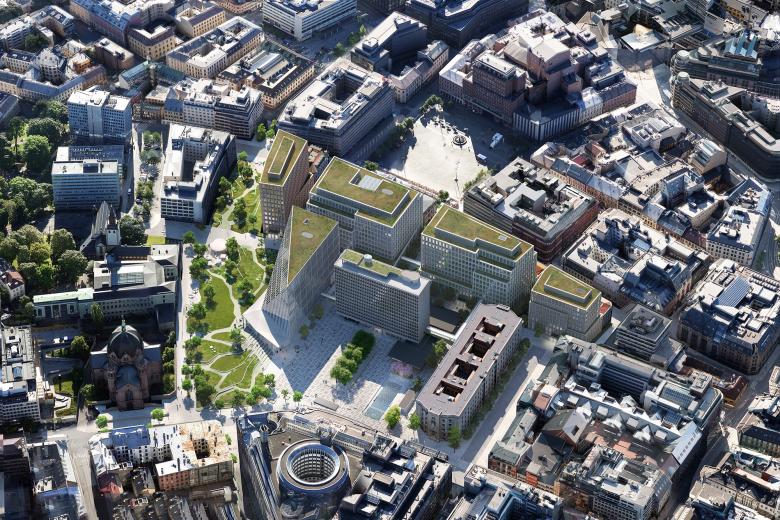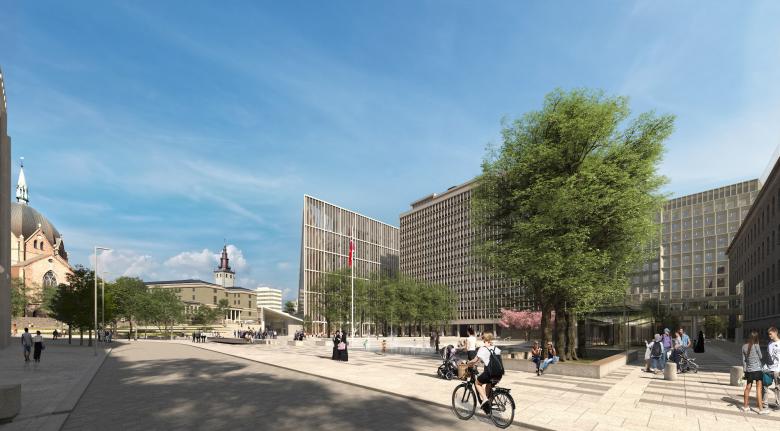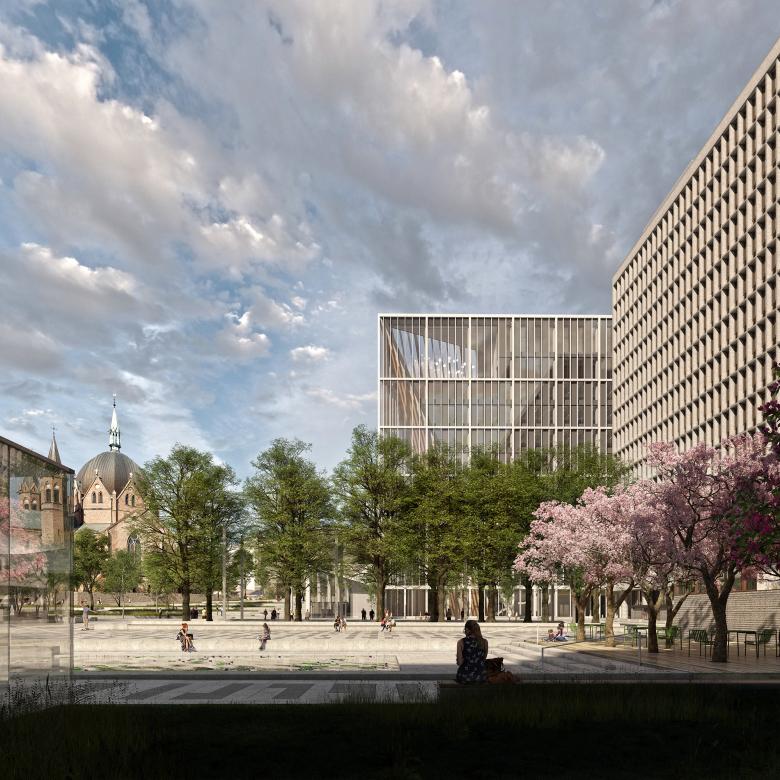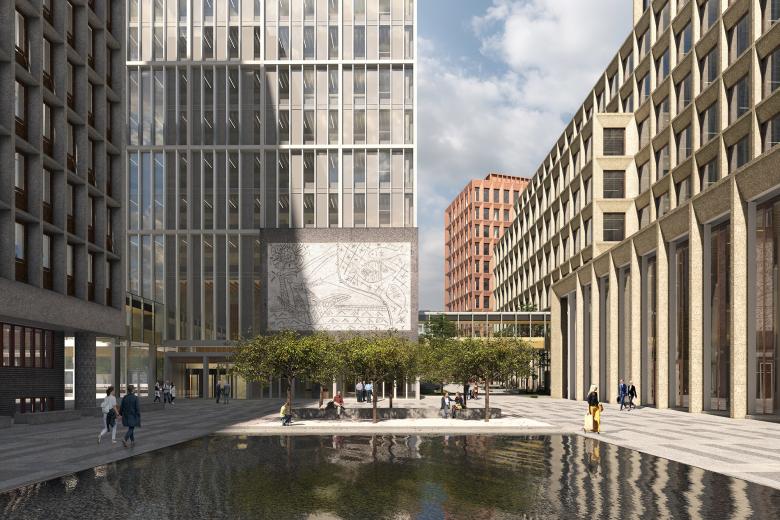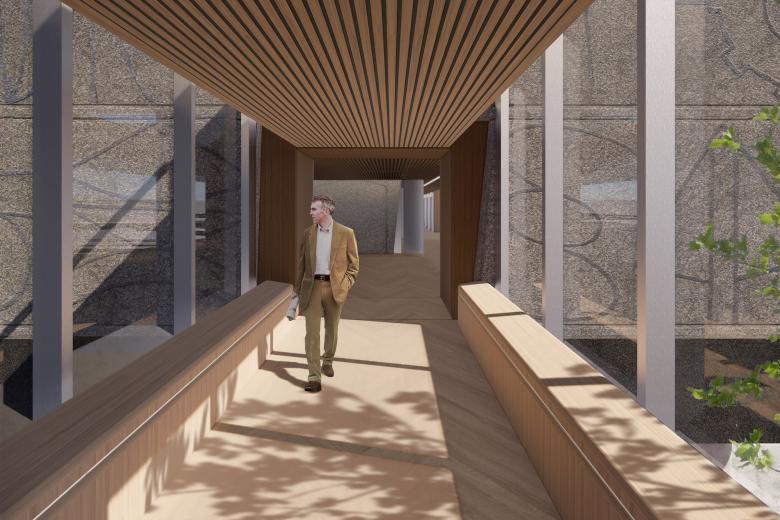Open, Green and Safe
Ulf Meyer
19. September 2022
Aerial view of Oslo’s new government district (Visualization: Statsbygg/Team Urbis)
Eleven years after the terrorist attacks on Oslo and Utøya, Norway, Haptic and Nordic have been selected to design the new National Government Quarter in Oslo.
In the 1950s, Erling Viksjø (1910–1971), one of Norway’s best postwar architects, became known for his collaborations with famous artists such as Pablo Picasso. In his bare concrete architecture and high-rise buildings, he worked with artists the Government Quarter in Oslo, the Norsk Hydro building, and the Bakkehaugen Church, among others. Influenced by Le Corbusier and Marcel Breuer, Viksjø's trademark were sandblasted concrete buildings and concrete facades with rock patterns. Viksjø’s first major commission was the Høyblokka in Oslo’s Government Quarter. Both the Høyblokka, (H-Block, 1946–59) and the later Y-blokka (Y-Block, 1952–69) were decorated with murals, including Picasso’s The Fishermen and The Seagull. Eleven years ago this tight bond between art and architecture was rocked, when the building was destroyed during a terrorist attack.
View from Akersgata (Visualization: Statsbygg/Team Urbis)
Norway may be known as a wealthy and peaceful nation on the periphery of the European continent, but on the afternoon of July 22, 2011, an explosion rocked downtown Oslo, killing dozens. The device was placed in a van parked in front of the H-Block building, which housed the offices of the Prime Minister and the Ministry of Justice. The nearby Ministries for Energy, Finance and Education and the Supreme Court were also hit. Later, the announcement of the preservation of H-Block and demolition of Y-Block sparked protests, not least because the precious murals could not be separated from the building.
Høyblokka (Visualization: Statsbygg/Team Urbis)
Eleven years later, the plan for the Government Quarter has been finalized: five new buildings will be built and two buildings will be rehabilitated, while three of the buildings damaged after the bombing have been demolished. With the exception of the Ministry of Defense, all ministries will be located in the new quarter to "help with security and resources," according to a statement from Statsbygg, the government’s building and construction agency. The new Government Quarter should not only be safe but also an attractive workplace and district. It is supposed to "represent the country with a monumental character,” according to Statsbygg’s brief "without appearing flashy."
The Picasso mural in its new urban setting (Visualization: Statsbygg/Team Urbis)
Two proposals were under consideration, one by "Team Urbis," made up of Haptic from London and Oslo and Oslo's Nordic, and another by A-lab and LPO Architects. The decision was made to go forward with the Team Urbis proposal (Haptc and Nordic are also working with engineering firm Ramboll and landscape studios SLA and Bjorbekk & Lindheim).
The winning design foresees the creation of a new square and pedestrian routes that weave between the cluster of buildings. Public facilities are distributed across the ground floors, while bridges create safe and dry connections on upper levels. "The large footprints of the buildings allow lower volumes," states Statsbygg. The Team Urbis designers paid attention to the articulation of the street facades for the buildings that will house 5,700 workplaces. The design is based around two urban squares and a new park, with facades featuring setbacks that are supposed to "aid the connection between buildings and their surroundings, as well as allowing sunlight to reach the new urban spaces," according to Team Urbis.
Bridges connect the buildings in the cluster (Visualization: Statsbygg/Team Urbis)
Gudmund Stokke, partner at Nordic and spokesperson for the team’s project, claims to "have designed a timeless scheme which has the potential of enhancing the central areas of Norway's capital city and providing great working conditions." The murals will be saved and integrated into the buildings, even if they now speak an earlier aesthetic language.
Verwandte Artikel
-
Trosten, a Folly in Front of Munch
08.07.24
-
Reimagining a Splendid Past
01.02.23
-
Open, Green and Safe
19.09.22
-
A Giant for the Arts
09.06.22
-
Pilestredet 77-79
26.08.20
